I'm working on a project in which I need to send data to an MQTT broker installed on a Raspberry Pi.
I refer to the tinyGSM library and this tutorial along with this example.
The ESP32 remains in infinite restart mode.
I would like to know if anyone has already tried this library. How can you configure the pin power motioned here?
My program:
// Select your modem:
#define TINY_GSM_MODEM_SIM800
// Set serial for debug console (to the Serial Monitor, default speed 115200)
#define SerialMon Serial
// Set serial for AT commands (to the module)
// Use Hardware Serial on Mega, Leonardo, Micro
#ifndef __AVR_ATmega328P__
#define SerialAT Serial1
// or Software Serial on Uno, Nano
#else
//#include <SoftwareSerial.h>
SoftwareSerial SerialAT(2, 3); // RX, TX
#endif
// See all AT commands, if wanted
// #define DUMP_AT_COMMANDS
// Define the serial console for debug prints, if needed
#define TINY_GSM_DEBUG SerialMon
// Range to attempt to autobaud
// NOTE: DO NOT AUTOBAUD in production code. Once you've established
// communication, set a fixed baud rate using modem.setBaud(#).
#define GSM_AUTOBAUD_MIN 9600
#define GSM_AUTOBAUD_MAX 115200
#define TINY_GSM_USE_GPRS true
#define TINY_GSM_USE_WIFI false
const char apn[] = "iamgprs1.ma";
const char gprsUser[] = "";
const char gprsPass[] = "";
const char wifiSSID[] = "YourSSID";// Your WiFi connection credentials, if applicable
const char wifiPass[] = "YourWiFiPass";
// MQTT details
const char* broker = "192.168.1.111";// Public IP address or domain name
const char* topicLed = " esp32/output";
const char* Topic_Temperature = "esp32/temperature";
const char* Topic_Humidity = "esp32/humidity";
/*
const char* topicLed = " esp32/output";
const char* topicInit = "GsmClientTest/init";
const char* topicLedStatus = "GsmClientTest/ledStatus"; */
#include <TinyGsmClient.h>
#include <PubSubClient.h>
#ifdef DUMP_AT_COMMANDS
#include <StreamDebugger.h>
StreamDebugger debugger(SerialAT, SerialMon);
TinyGsm modem(debugger);
#else
TinyGsm modem(SerialAT);
#endif
TinyGsmClient client(modem);
PubSubClient mqtt(client);
uint32_t lastReconnectAttempt = 0;
void mqttCallback(char* topic, byte* message, unsigned int len) {
SerialMon.print("Message arrived [");
SerialMon.print(topic);
SerialMon.print("]: ");
SerialMon.write(message, len);
SerialMon.println();
String messageTemp;
for (int i = 0; i < len; i++) {
Serial.print((char)message[i]);
messageTemp += (char)message[i];
// Only proceed if incoming message's topic matches
if (String(topic) == " esp32/output") {
Serial.print("Changing output to ");
if(messageTemp == "on"){
Serial.println("on");
}
else if(messageTemp == "off"){
Serial.println("off");
}
}
}
}
boolean mqttConnect() {
SerialMon.print("Connecting to ");
SerialMon.print(broker);
// Connect to MQTT Broker
//boolean status = mqtt.connect("GsmClientTest");
// Or, if you want to authenticate MQTT:
boolean status = mqtt.connect("GsmClientName", "username", "user");
if (status == false) {
SerialMon.println(" fail");
return false;
}
SerialMon.println(" success");
mqtt.publish( "esp32/temperature","32");
mqtt.publish("esp32/humidity", "80");
return mqtt.connected();
}
void setup() {
// Set console baud rate
SerialMon.begin(115200);
delay(10);
#define RXD2 16
#define TXD2 17
SerialMon.println("Wait...");
// Set GSM module baud rate
TinyGsmAutoBaud(SerialAT, GSM_AUTOBAUD_MIN, GSM_AUTOBAUD_MAX);
// SerialAT.begin(9600);
delay(6000);
// Restart takes quite some time
// To skip it, call init() instead of restart()
SerialMon.println("Initializing modem...");
modem.restart();
// modem.init();
String modemInfo = modem.getModemInfo();
SerialMon.print("Modem Info: ");
SerialMon.println(modemInfo);
#if TINY_GSM_USE_GPRS
// Unlock your SIM card with a PIN if needed
//if (GSM_PIN && modem.getSimStatus() != 3) { modem.simUnlock(GSM_PIN); }
#endif
#if TINY_GSM_USE_WIFI
// Wifi connection parameters must be set before waiting for the network
SerialMon.print(F("Setting SSID/password..."));
if (!modem.networkConnect(wifiSSID, wifiPass)) {
SerialMon.println(" fail");
delay(10000);
return;
}
SerialMon.println(" success");
#endif
#if TINY_GSM_USE_GPRS && defined TINY_GSM_MODEM_XBEE
// The XBee must run the gprsConnect function BEFORE waiting for network!
modem.gprsConnect(apn, gprsUser, gprsPass);
#endif
SerialMon.print("Waiting for network...");
if (!modem.waitForNetwork()) {
SerialMon.println(" fail");
delay(10000);
return;
}
SerialMon.println(" success");
if (modem.isNetworkConnected()) { SerialMon.println("Network connected"); }
#if TINY_GSM_USE_GPRS
// GPRS connection parameters are usually set after network registration
SerialMon.print(F("Connecting to "));
SerialMon.print(apn);
if (!modem.gprsConnect(apn, gprsUser, gprsPass)) {
SerialMon.println(" fail");
delay(10000);
return;
}
SerialMon.println(" success");
if (modem.isGprsConnected()) { SerialMon.println("GPRS connected"); }
#endif
// MQTT Broker setup
mqtt.setServer(broker, 1883);
mqtt.setCallback(mqttCallback);
}
void loop() {
// Make sure we're still registered on the network
if (!modem.isNetworkConnected()) {
SerialMon.println("Network disconnected");
if (!modem.waitForNetwork(180000L, true)) {
SerialMon.println(" fail");
delay(10000);
return;
}
if (modem.isNetworkConnected()) {
SerialMon.println("Network re-connected");
}
#if TINY_GSM_USE_GPRS
// and make sure GPRS/EPS is still connected
if (!modem.isGprsConnected()) {
SerialMon.println("GPRS disconnected!");
SerialMon.print(F("Connecting to "));
SerialMon.print(apn);
if (!modem.gprsConnect(apn, gprsUser, gprsPass)) {
SerialMon.println(" fail");
delay(10000);
return;
}
if (modem.isGprsConnected()) { SerialMon.println("GPRS reconnected"); }
}
#endif
}
if (!mqtt.connected()) {
SerialMon.println("=== MQTT NOT CONNECTED ===");
// Reconnect every 10 seconds
uint32_t t = millis();
if (t - lastReconnectAttempt > 10000L) {
lastReconnectAttempt = t;
if (mqttConnect()) { lastReconnectAttempt = 0; }
}
delay(100);
return;
}
mqtt.loop();
}
